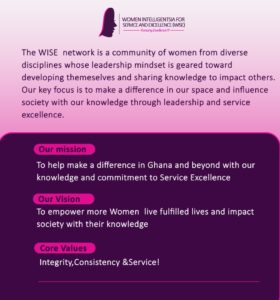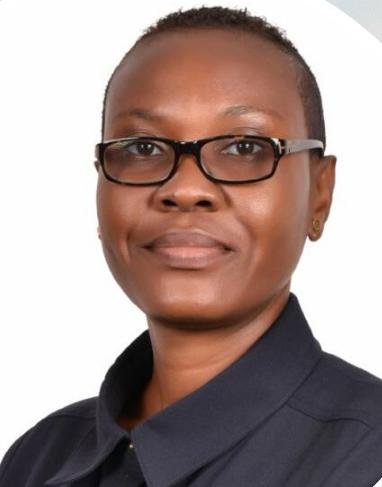
Accra, Ghana//-At dizzying speeds, the long-held stereotypical view regarding the role of women in society is being displaced.
Perhaps, their divinely-ordained responsibility of being a “help-meet” was weightier than met the eye…and long before the phrase “affirmative action” was coined, countless women had blazed the trail in breaking the glass-ceiling of role stereotypes and assuming key decision-making positions with profound strategic implications for the progress of their families, working teams or society.
Take, for instance, Jael, the wife of Heber, the Kenite. She welcomed fleeing Sisera, the general of the Canaanite army, in the days of Prophetess Deborah, and drove a tent pin through his temple, killing him instantly- at a time when Barak was afraid to pursue and annihilate Sisera and his army, even though the Lord had delivered them into the hands of Barak and Israel. (Judges Chapter 4).
Then, there was the woman of Thebez who cast an upper millstone down upon Abimelech’s head and broke his skull, at a time when all the men and women had fled to a strong tower within the city to seek refuge from the ruthless and cunning Abimelech and his forces.
Realising the fatality of the wound to his head, and not wanting his death to be credited to a woman, Abimelech ordered his armour-bearer to run him through with his sword. (Judges 9:50-55).
Without sounding far-fetched, let us consider Yaa Asantewaa, the queenmother of Ejisu, in the Ashanti Empire. She defied the demand of the British governor-general of the then Gold Coast, for the Golden Stool, and rallied the Ashantis to battle against the British.
Her bravery, resourcefulness and influence in marshalling her people into war against a technologically superior British side, make her a note-worthy epitome of women daring to break uncodified social barriers, with due cognizance of the dynamics of her era.
Today, many women have taken up the gauntlet, in the corporate world; medicine; academia; politics; business, space missions, house-keeping- virtually every space and have left indelible footprints in their wake.
Most Ghanaian families, for example, cannot narrate their stories without making mention of their mothers, who have been the fulcrum around which the family’s survival has revolved. From simply complementing the fathers’ efforts, most of these women have become the bread-winner for their families, juggling a myriad of odd jobs to keep the body and soul, together.
Reasonably, a mix of such attributes as, being strong communicators; expert multi-taskers; great listeners; effective team-players; motivated by challenges and above all, empathetic, makes them uniquely distinguishable in their role as leaders.
Nick Gaskell, in his write-up, “How to Perfect Team Leadership” aptly captures this thought thus: “with no team, a leader is irrelevant”. Certainly, a proportionate balance of the afore-mentioned and more provides the ‘magic potion’ for influencing the behavior and activities of others towards the accomplishment of specific goals- no wonder women make excellent leaders!
Such glaring facts make it almost impossible to side-step the significant feats achieved by women, the world over. Yet, the sad truth remains that, finding their place and proving their worth in society, still remains a daily struggle for the twenty-first century woman.
A recent study published by the MDPI encapsulates the obstacles that impede ‘both career persistence (staying at the top of the organisation) and the advancement of women in top management positions in Chile’ as ranging from individual, organisational and public policy triggers.
Specific issues cited included, ‘work-family integration; organisational environments with opaque and challenging working conditions; limited access into power networks’ amongst others.
The results of this study are transferrable and relatable, for the Ghanaian context and are instructive for shaping future decision-making, with the view to enlightening business leaders and public policy-makers, interested in designing organisations with gender diversity and inclusivity, high on their agenda.
Professional success is directly correlated with career persistence and career advancement/mobility. In other words, ‘women who are successful in their professional lives are those who persist – do not interrupt their career and/or advance, ie., are promoted ‘– (Salvaj and Kuschel 2018).
To this end, it is suggested that women, set career as a primary – not a secondary- domain. They must explore options such as asking for support from their partners and extended family, hire help and delegate both at work and home. Such strategies enable women optimize the use of their time, hence, focus on the key tasks at hand.
Capacity development is critical to women being best-in-class and remaining at the cutting-edge of their profession. While technical competence remains key to high levels of performance, soft-skills are an essential pre-requisite for distinguished performance at the top of the corporate ladder.
It is imperative, therefore, that the contemporary woman, pursues continuous professional development initiatives, that will enhance her skills at adaptability, communication, leadership, negotiation and networking, in order to remain relevant in her space.
Organisations must lean more towards redefining job structures and performance evaluation systems that are perceived as gender-inclusive.
The provision of intrapreneurial opportunities (corporate entrepreneurial ventures) for women; collaborative and cordial workplace environments; promotion policies to avoid glass-ceiling, are but a few of the strategies that organisations must intentionally deploy to promote gender inclusivity and diversity in the corporate world.
The formulation of robust public policies, to drive the agenda for greater female participation and advancement in the various spheres of nation-building, undergirds the strategies afore-mentioned.
Developing a regulatory framework that offers generous parental benefits; setting gender quotas for boards/executive positions and drawing up a code of governance on gender diversity are deliberate interventions, policy-makers may consider addressing the institutional gaps that mitigate the ascent of more women up the ladder of success.
Whilst the above discussion may not be all encompassing in its proposition, it, nevertheless, offers pragmatic and cogent alternatives, with the view to rewriting the narrative regarding enhanced female participation in nation-building efforts.
By Enid Araba Asamoah, a member of Women Intelligentsia For Service and Excellence (WISE) network

Reference:
The Administrative Sciences: Opening the “Black Box”. Factors Affecting Women’s Journey to Top Management Positions: A Framework Applied to Chile – by Katherina Kuschel and Erica Salvaj, 2018. Available online: http://www.researchgate.net (accessed on 22July 2021)


